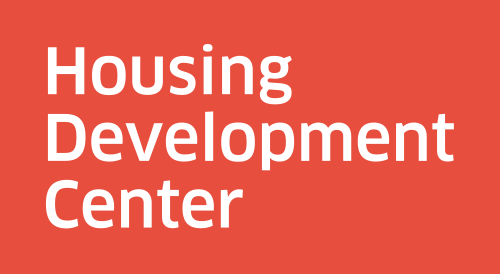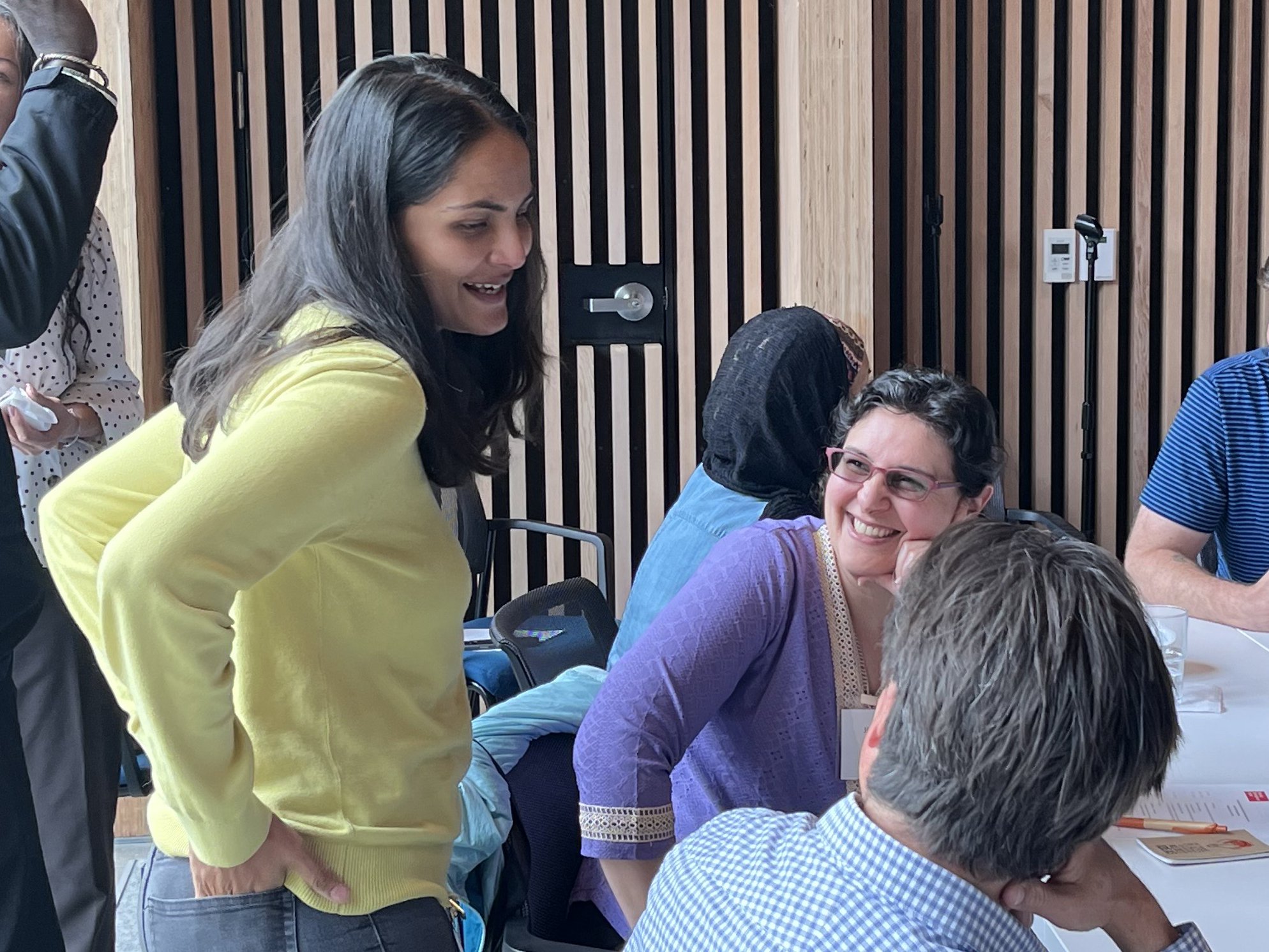Seven culturally specific organizations grow their knowledge of affordable housing ownership—together.
Staff from Self Enhancement Inc. and Immigrant and Refugee Community Organization (IRCO) chat during a break at the June 4 HECBS kick-off session.
Representatives of seven organizations serving culturally specific communities in the Portland-metro area gathered at Meyer Memorial Trust’s North Portland headquarters, on June 4, to kick off the 2025-2026 Housing Equity Capacity Building Strategy (HECBS) program.
The 18-month training program is designed for organizations that are new to affordable housing development and ownership or are transitioning to greater independence in their ownership roles. Each organizational team will gain essential knowledge and tools to set a strong foundation of affordable housing asset management, while building relationships with peers who are working toward similar goals and facing similar challenges.
HECBS is facilitated by HDC’s asset management team and co-sponsored by Meyer Memorial Trust and Oregon Housing and Community Services (OHCS). Meyer and OHCS staff attended the kick-off to greet participants and learn more about their organizations.
Participating organizations are young and old, big and small, focused on serving a wide spectrum of communities.
The Urban League of Portland, founded in 1945, seeks to empower African-Americans and others to achieve equality in education, employment, health, economic security, and quality of life.
Centro Cultural (Centro), founded in 1972, provides a broad range of services to empower Washington County’s Latino community to achieve well-being and economic prosperity.
The Immigrant and Refugee Community Organization (IRCO), founded in 1976, welcomes, serves, and empowers refugees, immigrants, and people across cultures and generations to reach their full potential.
Self Enhancement, Inc. (SEI), founded in 1981, provides underserved youth with support, guidance, and opportunities to achieve personal and academic success.
APANO, founded in 1996, unites Asians to build power, develop leaders, and advance equity through organizing, advocacy, community development and cultural work.
The Center for African Immigrants and Refugees Organization (CAIRO), founded in 2016, works to create equitable opportunities for African refugees and immigrant children, youth, and families to thrive.
Albina Vision Trust formed in 2017 to buy back land, rebuild Lower Albina, and re-root Black legacies and Black futures in the heart of Portland’s central city.
At the kick-off session, each organizational team introduced their organization, highlighted a current development project, and described the long-term vision that inspired their organization to begin its housing development journey. Then, HDC presented a brief primer on asset management concepts, after which participants broke into small groups to share perspectives on critical challenges they are encountering or anticipating in their roles as housing developers and owners.
“Participants spoke of the need to re-create spaces of cultural belonging in urban areas where redevelopment and displacement have broken communities apart.”
Organizational teams reported many common housing goals. Several said they sought to fill a void of affordable homes available for large families: CAIRO, for instance, is working to develop rental homes with four and five bedrooms. Many emphasized that access to culturally specific, trauma-informed property management is critical to their clients’ well-being and housing stability—and that its absence creates barriers to service provision. Participants also spoke of the need to re-create spaces of cultural belonging in urban areas where redevelopment and displacement have broken communities apart. In summary, the organizations’ journeys to develop culturally specific housing often started with the question, “If we don’t do it, who will?”
While becoming a housing developer-owner solves important problems for housing beneficiaries, it comes with a plethora of challenges for the sponsor, participants agreed. Some of the challenges the teams identified may be familiar to any affordable housing provider, such as unexpectedly high construction cost inflation, residents who run into temporary financial problems and can’t pay rent, and lack of adequate and stable funding sources for resident services—an obstacle that is especially difficult to surmount if one’s portfolio is small. Other challenges are felt differently by culturally specific organizations, such Fair Housing rules that prohibit landlords from targeting housing to specific cultural communities (or to, say, refugees). Several participants described complexities that arise when a community-based organization codevelops a property with a partner organization that has different interests and community stakes. Others named that community backlash and misperceptions can be a threat when an organization makes the transition to being a property developer and owner.
The kick-off session discussions touched only the surface of topics the cohort will continue to explore together between now and fall of 2026. As part of the HECBS program, in addition to six large-group sessions, each organization will have access to 35 to 45 hours of technical services and one-on-one consulting and training from HDC’s asset management team. Meyer and OHCS are funding HDC’s services, as well as providing grants to participating organizations to help subsidize the cost of their staff’s time in the program activities.
HDC’s asset management team is excited to partner with and learn more about each participating organization. The work of the 2026 HECBS cohort will build on the success of the HECBS pilot program, in 2022 to 2024, which focused on the needs of culturally specific organizations that are long-time housing owners.
Do you have questions about HECBS or HDC’s asset management training services? Please don’t hesitate to reach out to our team.

